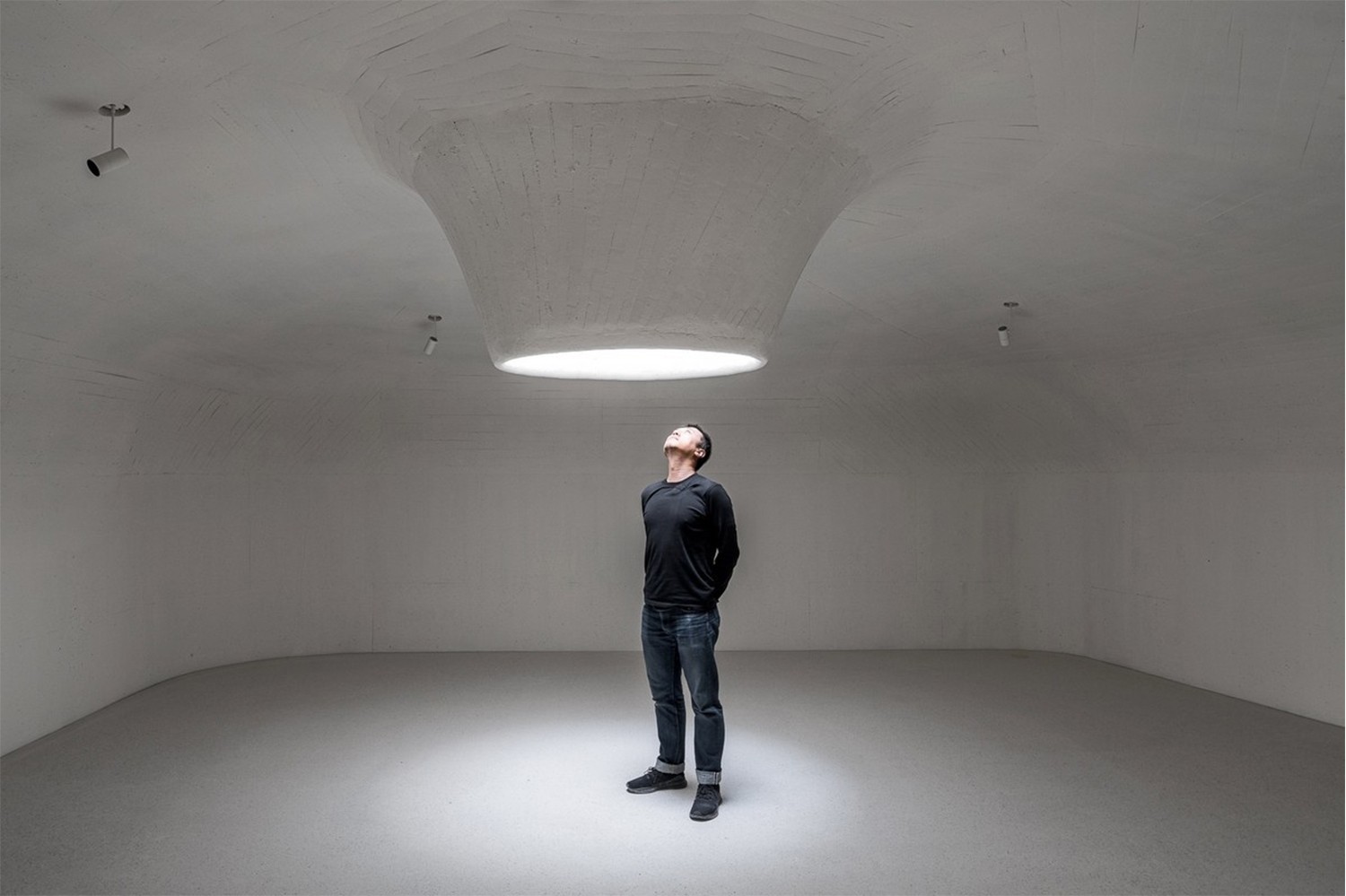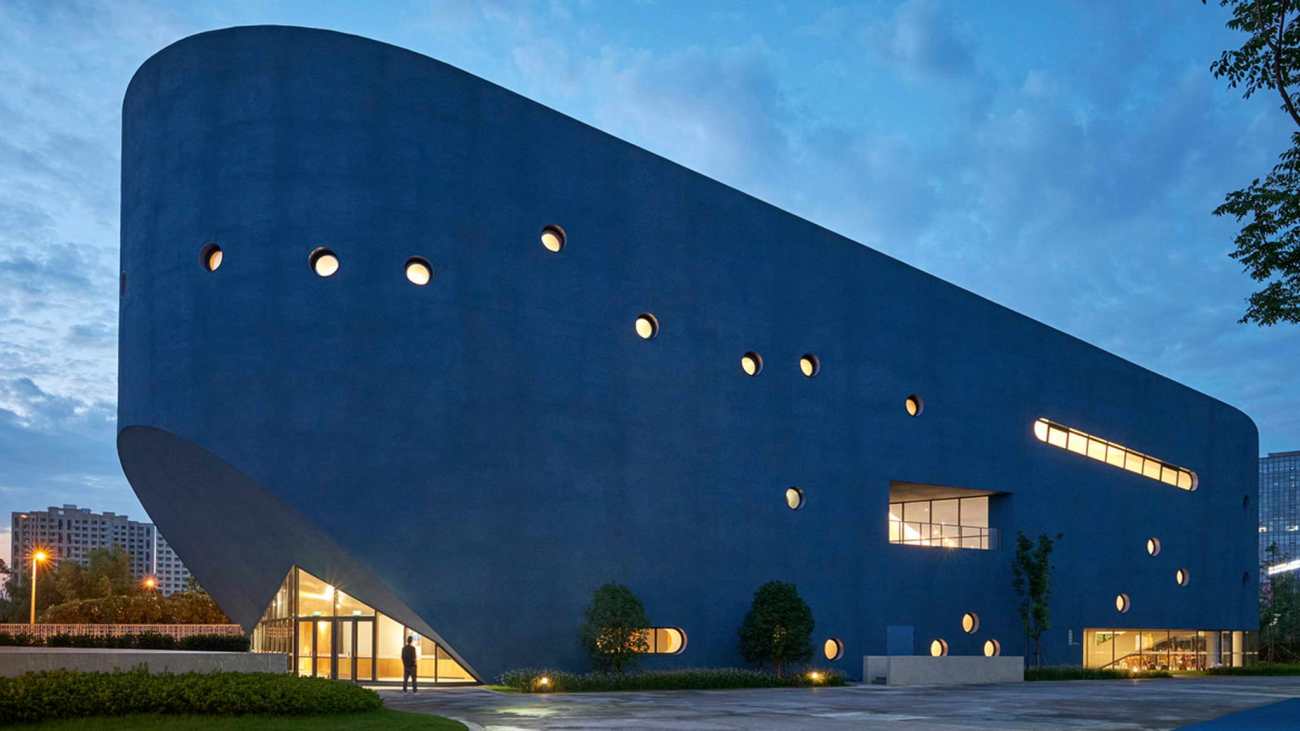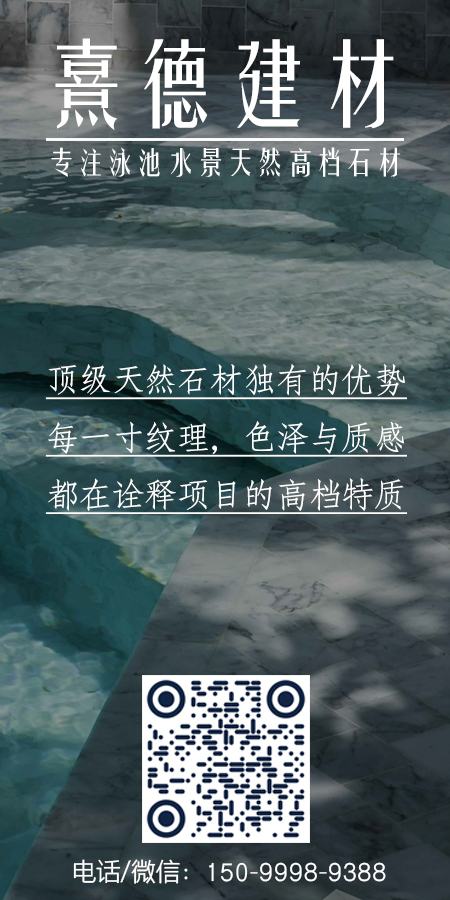在中国北部渤海湾昌黎县一段被称作黄金海岸的沙滩上,OPEN设计了一座消隐的美术馆,如同藏于沙丘之下的神秘洞穴。海岸沙丘经历了漫长的时间累积和风沙推移而自然形成,并被原生低矮灌木深扎的根系固化下来。将美术馆选址于沙丘之下,既是对自然的敬畏,也是一种保护:因为沙丘美术馆的存在,这片沙丘将永远不会人为“被推平”,从而维护了千百年累积下来但也十分脆弱的沙丘生态系统。
Countless years of wind have pushed the beach’s sand into a dune along the shore several meters high, stabilized by low-rising shrubs and other ground cover. The museum lies beneath this dune. Enveloped by sand, its interconnected, organically shaped spaces resemble caves—the primeval home of man, whose walls were once a canvas for some of humanity’s earliest works of art. Hidden between the sea and the sand, the design of the Dune Art Museum is simple, pure, and touching—a return to primal and timeless forms of space.
受启发于孩童们在海边挖沙的游戏,建筑师尝试在沙丘里“挖掘”创造出形态各异又互相连接的一些“洞穴”——这也是人类最原始的居住形态和最早的艺术创作场所。一系列细胞状的连续空间,构成了沙丘美术馆里丰富的功能,包括大小形态各异的展厅、接待厅和咖啡厅等。
The decision to create the art museum underneath the dunes surrounding it was born out of both the architects’ deep reverence for nature and their desire to protect the vulnerable dune ecosystem, formed by natural forces over thousands of years. Because of the museum, these sand dunes will be preserved instead of leveled to make space for ocean-view real estate developments, as has happened to many other dunes along the shore.
建筑的主入口是嵌入沙丘里的一个隧道般的洞口。经过长长的、幽暗的隧道,进入到一个圆顶有柔和天光的接待厅,然后空间豁然开朗——人们步入中央展厅,那里,一束光线从高高的穹顶上倾泻而下,光线在墙壁地面间跳跃折射,空间弥漫着静谧而神圣的精神光辉。
A series of cell-like contiguous spaces accommodate differently-sized galleries, a café, and some ancillary spaces. After passing through a long, dark tunnel and a small reception area, the space suddenly opens up as visitors enter the largest multifunctional gallery. There, a beam of daylight from the skylight above silently yet powerfully fills the space.
从沙丘美术馆内部看海,透过不同的洞口、在不同的时间里,大海都是不一样的风景。一部通往沙丘顶部观景平台的螺旋楼梯,引领人们从洞穴的暗处循着光线拾级而上,直到突然置身于天空与大海的广袤之间。在永恒的沙与海之间,建筑营造了一个隐匿的庇护所,将人的身体包裹其中,聆听自然与艺术的回响。
Looking through different openings framed by the building, museum-goers can observe the ever-changing expressions of the sky and sea throughout the day. A spiral staircase leads to a lookout on top of the sand dune, guiding curious audiences from the dark recesses below to the vast openness above. Underfoot, the museum emerges as a hidden shelter, intimate to the body and soul—a place to thoughtfully contemplate both nature and art.
沙丘美术馆复杂的三维曲面壳体,是由秦皇岛当地擅长造船的木工,用木模板等小尺度线性材料手工编织出的模板定型,并用混凝土浇筑而成。建筑师保留了混凝土壳体上留下的不规则甚至不完美的肌理,让手工建造的痕迹可以被触摸、被感知。除此之外,沙丘美术馆里突破常规形态的门窗、接待台、吧台、卫生间洗手台均为手工打造,甚至连咖啡馆的8张桌子也由建筑师依照各个展厅不同的平面形状而设计定制。
The complex three-dimensional geometry of the Dune Art Museum’s concrete shell was shaped by hand by local workers in Qinhuangdao (some of whom were former shipbuilders), using formwork made from small strips of wood and occasionally, some more elastic materials when tighter curvatures were needed. The architect deliberately retained the irregular and imperfect texture left by the formwork, allowing traces of the building’s manual construction to be felt and seen. In addition, the building’s doors and windows, reception desk, bar counter, and bathroom sinks are all custom-designed and made on-site. The eight tables in the café are also designed by the architect, each with a distinct shape matching that of the floor plans of the eight main gallery spaces.
这座美术馆不仅在形态上与自然融为一体,其建造体系中运用的一系列节能措施,也尽可能地实现了建筑的可持续性。由植被和沙土覆盖的屋面大大降低冬夏两季的能源负荷;各个朝向不同、大小不一的天窗为美术馆提供全天候的自然采光;低能耗、零排放的地源热泵系统代替传统空调,为艺术空间提供恒温恒湿的室内环境。
The building’s many skylights, each with a different orientation and size, provide carefully tempered natural lighting for the museum’s spaces at all times of the year; its sand-covered roof greatly reduces the building’s summer heat load; and a low-energy, zero-emission ground source heat pump system replaces traditional air conditioning.
建筑+室内设计:OPEN建筑事务所
设计时间:2015-2018
阶段:完成
甲方:阿那亚
运营方:UCCA当代艺术中心
功能:展厅,接待厅,咖啡厅,室外展览,观海平台
建筑面积:930 m²
地点:中国,秦皇岛
项目团队:
主持建筑师:李虎,黄文菁
设计团队:周亭婷(项目建筑师),王萌萌,胡伯骥,方冠颖,Joshua PARKER,卢笛,林碧虹,叶青,史程昱,贾瀚
合作设计院:建研科技股份有限公司
照明设计:清华大学建筑学院张昕工作室 + OPEN建筑事务所
Design Year: 2015 – 2018
Status: Completed
Client: Aranya
Operator: UCCA
Program: Reception, Café, Community Room, Exhibition Spaces, Outdoor Exhibition, Roof Terrace
Building Area: 930 m²
Location: Qinhuangdao, China
Architects: OPEN Architecture
Principals in Charge: LI Hu, HUANG Wenjing
Project Team: ZHOU Tingting (Project Architect), WANG Mengmeng, HU Boji, FANG Kuanyin, Joshua PARKER, LU Di, LIN Bihong, YE Qing, Steven SHI, JIA Han
Local Design Institute: CABR Technology Co., Ltd.
Lighting Design: X Studio, School of Architecture, Tsinghua University, China + OPEN Architecture
更新日期:2020-04-29 15:18:36
非常感谢 OPEN建筑事务所 带来的精彩项目, 查阅更多Appreciations towards OPEN Architecture for sharing wonderful work on hhlloo. Click to see more works!















